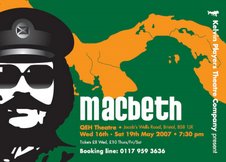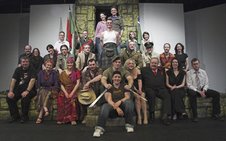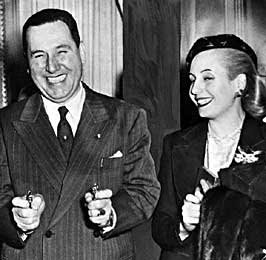Macbeth in Caledonia
Macbeth set in the jungles of Central America in the late 1970s/early 1980s. Why?
Reasoning
Casting around for a way to present Macbeth without recourse to the ‘traditional’ medieval setting, I came to the idea of the Latin American juntas of the 1970s, where the military overthrew the legitimate governments of the time – think Peron, Evita, Galtieri and Pinochet. Bringing Macbeth into this setting allows us to clearly state that the story is timeless and handily also proffers up some wonderful associated imagery and themes: neat military outfits, the heat of the jungle, the indigenous Mayan-style culture in the background – Apocalypse Now in Shakespearian language… But how do I justify this as a setting for ‘the Scottish play’?
Historical Shoehorning
It is an historical curiosity that, in the dying years of the 17th century, a private Scottish company raised investment to fund the establishment of a colony in Latin America based on spurious accounts of the wealth to be had there. In 1698 the first of two ships, laden with hopeful colonists, left for the Darien Peninsula in today’s Panama, and founded ‘New Caledonia’. Within a few years most of the colonists were dead and the colony was abandoned.But what if it had not failed? Imagine that the Republic of Caledonia now sits astride the Panamanian isthmus, making its money from tobacco plantations and its world-famous Darien Canal. With its own tartan and its own idea of bagpipes. Having picked a modern theme, and come up with the historical justification, I then allowed the idea to gather its own logic.
Value Added
The most significant strand that is now to be threaded through the kilt of this ‘Macbeth in Caledonia’ is the Mayan culture. I see the Scottish-based ruling class in this fictional republic to be the alien invaders of an ancient and distinct land. Their imposed culture of titles, privileges, power and corruption sits on very shallow foundations. Beneath it, around it and permeating its darker moments is the indigenous culture (for the ease of finding reference material and ideas I have stretched the Mayan empire by about a 1000 miles to the south, but it is not unreasonable to think that, in our altered timeline, their influence might well have extended). Now we have a new undercurrent running through Shakespeare’s historical play. There is now a question of legitimacy beyond the squabbling of Macbeth and Macduff, right down to who deserves to be running this country. Them or us?
Thematic Considerations
What we have, then, is a 1970’s style steamy jungle: military uniforms, the constant sound of crickets in the night, a garish and non-permanent feel to the action. As its backdrop we have a much more ancient, proud and indifferent Mayan culture, with ancient beliefs, and a permanent confidence that it is they who own this land.To reflect this in the set, the action thunders around the immovable stone ruins of the Mayan culture: there when the audience and the actors enter, there throughout the power shifts in the play, there at the end as the theatre darkens; unchanging and indifferent to the flash of death and intrigue mustered by the Scots.
skip to main |
skip to sidebar

macbeth.QEH@gmail.com

Cast & crew (thanks Respectable Image)

16th-19th May 2007, QEH Theatre, Bristol

macbeth.QEH@gmail.com
Pic of the day

Cast & crew (thanks Respectable Image)
Key Information
Contributors
Keep Smiling

1 comment:
This is a bloody great idea - where better to be driven mad by your own guilt (and your own power-crazed wife) than in the jungles of central America, guerilla-style? I don't think the Mayan empire shift will be a problem given that the word "Mayan" doesn't appear in the script - but who would have been living in Panama then anyway? Spaniards? Incas? Anyway, good luck with th rehearsals, and I am gutted I'll miss the shows. Blog on though!
Post a Comment